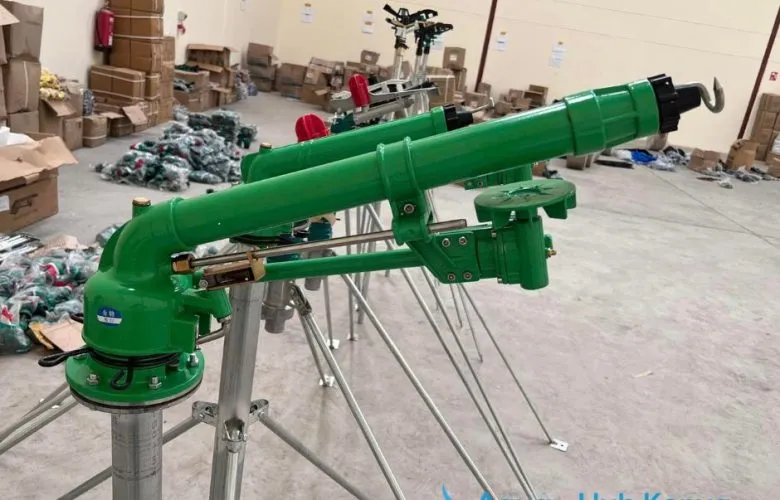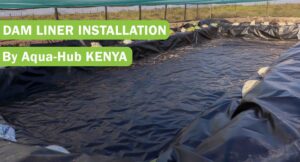Rain Gun Sprinkler Price in Kenya is KES 8,000 – KES 38,000. Aqua Hub’s Rain Gun Sprinklers are popular irrigation accessories for large farm and field irrigation in Kenya. These irrigation devices provide high flow rates and coverage area in crop plantations that are not possible with other systems.
In this blog post, we’ll discuss Rain Gun Sprinkler Price in Kenya, what makes them a smart investment, and how to choose the best one for your farm. If you’re considering upgrading your irrigation system, this guide is for you.
Call 0790719020 for orders or queries.
Rain Gun Sprinkler by Aqua Hub LTD
Aqua Hub Kenya is one of the most trusted suppliers of rain gun sprinklers in the country. They sell high-quality irrigation systems that suit various types of farming vegetables, maize, pasture, coffee, and more.
Their rain guns are built to last and come in different models depending on your farm size and water pressure. Besides, Aqua Hub LTD will also guide you or handle the setup, maintenance, and provide after-sales service.
Rain Gun Sprinkler Price in Kenya
So, how much do rain gun sprinklers cost in Kenya?
Here’s a breakdown of the average rain gun sprinkler prices in Kenya from Aqua Hub as of 2025:
| Rain Gun Size | Price Range (KES) | Coverage Area |
| 1 Inch | KES 6,000 – 8,500 | Up to 30 meters radius |
| 1.5 Inch | KES 13,000 – 37,000 | Up to 40 meters radius |
| 2 Inch | KES 14,000 – 58,000 | Up to 50 meters radius |
Considering the area of coverage, a rain gun sprinkler is a cost-effective solution compared to furrow irrigation, especially for large fields.
Specifications of Rain Gun Sprinklers
Here are the basic features and specifications you’ll find in most rain gun sprinklers sold by Aqua Hub:
- Spray Radius: 25 – 50 meters
- Water Pressure Required: 2.5 to 5 bar
- Discharge Rate: 3,000 – 9,000 litres per hour
- Nozzle Sizes: 12 mm, 14 mm, 16 mm
- Material: Brass, Aluminium or Stainless Steel
- Rotation: Full circle (360°) or Part-circle (adjustable)
- Mounting Options: Tripod stand, riser pipe, or mounted on a trolley
These features allow the rain gun to simulate natural rainfall, which is gentle on plants and helps prevent soil erosion.
Types of Rain Gun Sprinklers
Rain gun sprinklers come in different types based on the material, spray pattern, size, and operation. The most common types in Kenya are:
- High-Pressure Rain Guns: Best for large fields. Requires a strong water pump.
- Medium-Pressure Rain Guns: Suitable for medium farms and easy to operate.
- Low-Pressure Rain Guns: Ideal for small-scale farmers and lower water flow.
- Brass Rain Guns: Durable and corrosion resistant.
- Plastic Rain Guns: Lightweight and more affordable but less durable.
Farmers choose rain guns based on the size of their land, water availability, and crop type. Aqua Hub offers all these types to suit different needs.
Rain Gun Sprinkler Models: PY Series
In Kenya, the PY series is one of the most popular rain gun models.
PY Series Rain Guns:
- Available models PY30, PY40 and PY50.
- Made from brass or aluminum.
- Available in sizes from 1″ to 2″
- Adjustable spray angles (30° to 360°)
- Strong throw and high discharge
- Can be used for both fixed and portable irrigation systems
All these models are designed for efficient water distribution and are compatible with Kenyan farm setups.
Requirements for a Rain Gun Sprinkler System
To set up a working rain gun system, you need more than just the sprinkler head. Here are the main components:
- Water Pump: To provide pressure.
- Main Pipe: Usually HDPE or PVC, to carry water from the source.
- Connector Pipes: To link the pump and the rain gun.
- Rain Gun Stand or Tripod: For mounting the gun.
- Pressure Regulator (optional): To control water pressure.
- Water Source: A dam, borehole, or tank.
Make sure you have a reliable water supply. Rain guns use more water than drip irrigation, but they cover larger areas faster.
Which Pump Should I Use for Rain Guns?
Rain guns require medium to high-pressure water pumps. The right pump depends on the type and number of rain guns you want to operate at once.
Recommended Pump for Rain Gun sprinklers
- Centrifugal Pumps – Best for rain gun setups, especially when using water from open sources like rivers or dams.
- Diesel or Petrol Water Pumps – Useful where electricity is not available.
- Electric Booster Pumps – Efficient and quiet but need stable electricity.
Pump Pressure: At least 2.5 bar for a small gun, and up to 5 bar for a large gun.
Pump Capacity: A pump that can deliver 20,000 liters per hour is usually good enough for most farms using 1–2 rain guns.
How to Set Up and Use Rain Gun Sprinklers
Setting up a rain gun is not complicated if you follow these steps:
Step 1: Choose the Right Location
Install the rain gun where it can cover the most ground. For large fields, use multiple guns in a grid pattern.
Step 2: Install the Stand
Fix the rain gun on a tripod stand or metal riser pipe to give it the necessary height.
Step 3: Connect the Pipes
Use HDPE pipes to connect the pump to the rain gun. Ensure there are no leaks.
Step 4: Start the Pump
Power the pump and check the water pressure. Adjust the pressure if needed.
Step 5: Set the Angle and Rotation
You can adjust the gun to spray in a full circle (360°) or a semi-circle depending on your field layout.
Step 6: Irrigate in Sessions
Water your field in zones or blocks. Shift the rain gun as needed.
Maintenance Tip: Always flush the pipes and check the nozzles for blockages. Clean the filters and store the guns properly when not in use.
How to Choose Rain Gun Sprinklers
When choosing a rain gun, consider these key factors:
- Size of Your Farm: Bigger farms need higher-capacity rain guns.
- Water Pressure Available: Choose a model that matches your pump pressure.
- Crop Type: Some crops need gentle watering; others can handle heavy showers.
- Budget: Rain guns vary in price; find one that gives value for money.
- Durability: Invest in quality materials like brass or stainless steel.
Consult experts at Aqua Hub to get help choosing the right model for your land.
Which Crops Are Best for Rain Gun Sprinklers?
Rain guns work best for crops that are grown on open fields and need wide water coverage. Here are some crops that benefit from rain gun irrigation:
- Maize
- Sorghum
- Wheat
- Beans
- Pasture Grass
- Coffee
- Sugarcane
- Barley
- Fodder such as Napier, Lucerne and Star grass
- Cotton
- Oats
Avoid using rain guns on crops with delicate flowers or fruits during flowering, as the strong spray might damage them.
Are Rain Gun Sprinklers Worth Investment?
Rain gun sprinklers are revolutionizing irrigation in Kenya. They’re fast, efficient, and perfect for both medium and large-scale farming. While the rain gun sprinkler price in Kenya may seem high at first, the long-term savings in Labor, water, and increased yields make it worth every shilling.
If you’re ready to invest in a reliable irrigation system, contact Aqua Hub Kenya. They offer affordable rain gun sprinklers, expert advice, and nationwide delivery.





